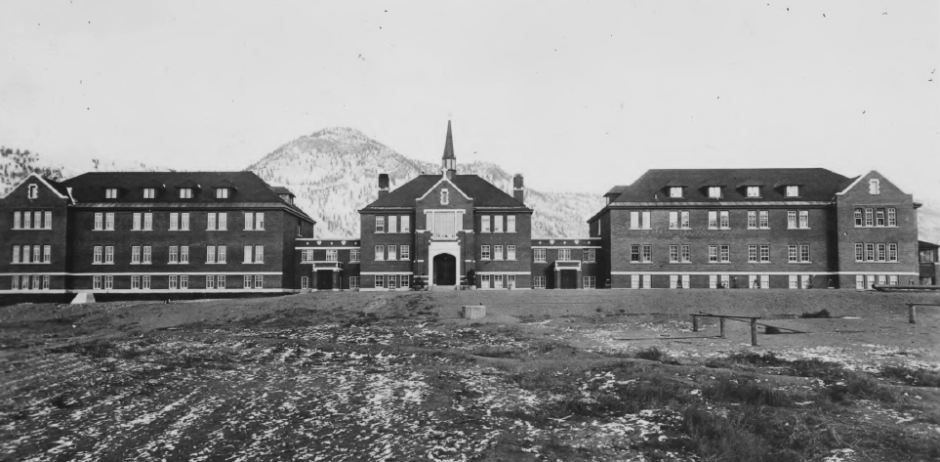Content warning: this web page contains information about residential schools in Canada and may be distressing to some readers.
Residential Schools in Canada
Below are a number of crisis resources for residential school survivors, as well as resources for settlers who want to learn more about the ongoing impacts of the Indian Residential School system. For more information and resources visit our “Reconciliation” page and our “Indigenous Peoples in Canada” page.
Photograph of Kamloops Indian Residential School, undated. From the Oblate Fathers (Deschatelets) – Les Oeuvres Oblates de l’Ontario collection at the National Centre for Truth and Reconciliation (10a-c000432-d0007-001).

- Last updated: June 17, 2024
ON THE SHELF
Check these out the next time you’re in the Library or place holds now.
The Truth of Residential Schools
The Truth of Residential Schools
on the web
These recommended websites are free and easily accessible! All you need is an internet connection.
The IRSSS counselling team supports emotional, mental, and spiritual development, along with healing and recovery, through culturally-based values and guiding principles for Survivors, families and communities.
From an Indigenous perspective, this free Massive Open Online Course (MOOC) explores key issues facing Indigenous peoples today from a historical and critical perspective highlighting national and local Indigenous-settler relations.
The KUU-US Crisis Line Society provides a First Nations and Indigenous specific crisis line available 24 hours a day, 7 days a week, toll-free from anywhere in British Columbia.
Crisis Lines:
- Adult/Elder Line: 250-723-4050
- Child/Youth Line: 250-723-2040
- BC Wide Toll Free:1-800-KUU-US17 (1-800-588-8717)
- Métis Crisis Line: 1-833-MétisBC (1-833-638-4722)
The Legacy of Hope Foundation (LHF) is a national, Indigenous-led, charitable organization that has been working to promote healing and Reconciliation in Canada for more than 19 years. The LHF’s goal is to educate and raise awareness about the history and existing intergenerational impacts of the Residential School System and subsequent Sixties Scoop on Indigenous (First Nations, Inuit, and Métis) Survivors, their descendants, and their communities to promote healing and Reconciliation.
The National Student Memorial Register was created to forever remember and honour the children who never returned home from residential schools. The development of this memorial register is the result of work by countless people and the advice, guidance and blessings from Survivors, Elders and Knowledge Keepers.
"Non-Indigenous people — here’s what you can do, right now: 7 ways to support Indigenous people grieving in wake of news about 215 children."
by Anna McKenzie, Local Journalism Initiative Reporter and Jacqueline Ronson
IndigiNews, June 2 2021.
The Royal BC Museum's curated collection of books, videos, images, and numerous resources relating to Residential Schools.
CBC researched the progress of each Call to Action, by reaching out to relevant governments, faith groups, professional and community organisations for comment. They also cross-referenced federal funding announcements with actual and past financial expenditures.
A short video from award-winning Cree and Lakota author and educator Monique Gray Smith: "I share tips on both talking to kids about Residential Schools, but also how to prepare yourself as the adult to have these conversations. The video is for parents, grandparents, educators...anyone really with children in their lives. Also included are a number of author tips of books to read, podcasts, etc to deepen and continue your learning."
Documents the history of the United Church’s Indian Residential Schools in Canada, with pictures. This project was initiated by the Church’s Steering Committee on Residential Schools, comprised of Survivors from different residential schools across Canada and of United Church leaders and staff. It is intended as a form of repatriation to First Nations communities and recognition that the United Church has responsibility to engage in truth-telling about the Church’s role in the residential school system and in colonialism in general.
The Indian Residential School History and Dialogue Centre (IRSHDC) at UBC addresses the colonial legacy of residential schools and other policies imposed by the Canadian government on Indigenous Peoples, and ensures that this history is acknowledged, examined and understood within the UBC community.
Yúusnew̓as is a Sḵwx̱wú7mesh community-led project to research and document the residential school experiences of our people. Our intent is to provide a safe space to listen to our truth-tellers and to take care of one another with cultural, emotional, and spiritual wellness support. This process has our ancestors, truth-tellers, and community at its heart as we highlight pathways of healing for today and generations to come.